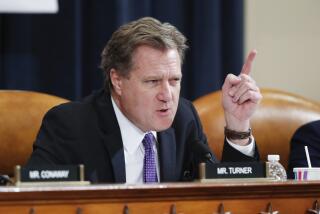U.S. Signals Talks With Soviets Will Be Tough
- Share via
WASHINGTON — The Reagan Administration, in two separate cases this week, signaled an uncompromising attitude toward the Soviet Union which almost certainly means that talk will be tough, and maybe even angry, during an unusually busy autumn of U.S.-Soviet diplomacy.
White House and State Department spokesmen insisted that there should be no link between the cases--the resumption of U.S. anti-satellite weapons testing and the accusation that Soviet secret police dusted American diplomats with a potentially dangerous chemical--and the scheduled U.S.-Soviet summit meeting in November or other crucial contacts preceding it.
White House spokesman Larry Speakes said that both steps were fully justified by the facts and denied that they were part of a propaganda war. As far as Washington is concerned, he said, they should not affect the prospects for a productive summit in Geneva between President Reagan and Soviet leader Mikhail S. Gorbachev.
However, there appears to be little doubt that the issues will affect not only the Reagan-Gorbachev meeting but also the atmosphere of the arms control talks that resume in Geneva next month and the scheduled meetings in late September between Soviet Foreign Minister Eduard A. Shevardnadze and Secretary of State George P. Shultz and Reagan.
Stiffer Bargaining Stances
And although the announcements’ timing may have more to do with White House efforts to keep Reagan in the news during his California vacation than with U.S.-Soviet diplomacy, they probably will stiffen the bargaining positions of each side in all of the upcoming talks.
The Soviets reacted angrily to both issues, threatening to resume their own anti-satellite testing program in response to the U.S. test and denouncing the “spy dust” charges as “absurd inventions.” But Moscow did not, at least so far, threaten to cancel the summit or pull out of the arms control talks.
Raymond L. Garthoff, a former arms control negotiator and author of a newly published book on the rise and fall of U.S.-Soviet detente, said that resumption of anti-satellite weapons tests “certainly will reduce Soviet expectations that we are prepared to make any kind of deal at Geneva (in the arms talks).”
Other non-government experts in U.S.-Soviet relations applauded the Administration’s hard line, however.
George Carver, a former CIA official now at Georgetown University’s Center for Strategic and International Studies, said: “I’m sure (the Soviets) will say we are poisoning the atmosphere and will try to bluff us out of anti-satellite testing. This is like poker: When you are faced with a bluff, you sometimes have to counterbluff. If you back down every time the other guy huffs and puffs, you will be backing down all the time.”
Of the two issues, anti-satellite testing is by far the most significant. The “spy dust” case has enough in common with popular fiction to stimulate the imagination--but it is far less likely to affect the strategic balance between the superpowers than the continuing race to develop weapons to attack the satellites that have become indispensable to modern warfare.
Experiment Postponed
The Pentagon had hoped to conduct the first test of its sophisticated satellite killer earlier this year, but the experiment was postponed. The announced reason for the delay was a technical one--the failure of an instrument-carrying balloon that was to have been used as a target. The balloon still does not work, but the White House said the test will go ahead anyway, using an obsolete satellite already in orbit as the target.
Garthoff, now a senior fellow at the Brookings Institution in Washington, said the Soviets probably considered the earlier postponement to be a gesture of good will preceding the second session of the arms control talks. To reschedule the test for the eve of the third session, he said, can be expected to have a strong--and negative--impact on Moscow.
“I have a feeling the President thinks he can have it both ways,” Garthoff said, “that the Soviets will come around and agree to some restraints on offensive weapons, even if the United States goes ahead with ASAT” and the so-called “Star Wars” missile defense program.
In announcing the new test program, Administration officials said the Soviets already have an operational anti-satellite weapon, described as rather crude in comparison to the American program. However, the Soviets have conducted repeated tests of their weapon--although apparently none since 1982--and the United States has not yet conducted any tests.
But Michael Vlahos, coordinator of security studies at Johns Hopkins University’s Foreign Policy Institute, said the United States is far behind the Soviets in anti-satellite technology.
‘In Miserable Shape’
“If we don’t undertake some development, we will be in miserable shape,” he said. “It’s not just a bargaining chip. We must ask ourselves if delaying the test would serve any useful purpose. A gesture of good will on our part in the wake of the enormous Soviet effort might be a sign that we were so soft in our negotiating position that we would forfeit the right to reach an agreement with the Soviets.”
Vlahos declared: “This isn’t an act of bravado--it is a very prudent step.”
More to Read
Sign up for Essential California
The most important California stories and recommendations in your inbox every morning.
You may occasionally receive promotional content from the Los Angeles Times.













